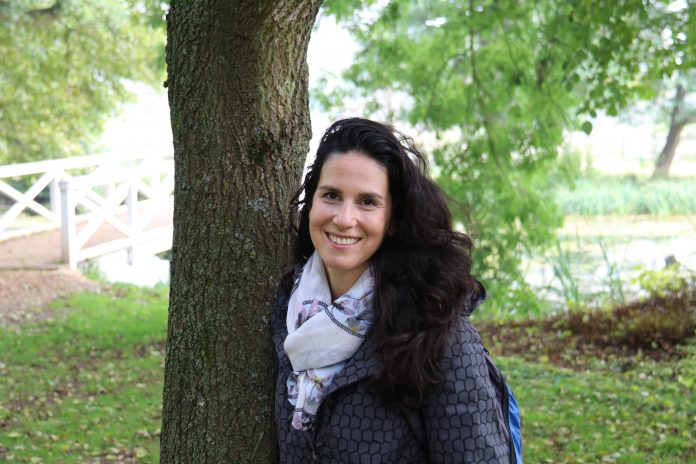
 Esther Donoff had always been interested in health and nutrition, but when she turned 40 she decided to develop this interest into a business. Having originally studied Pharmacology, Esther worked for 11 years conducting medical trials looking at how drugs affected people. Using her scientific background, she was able to build on her knowledge to retrain as a nutritional therapist, looking at how food and lifestyle can also affect people.
Esther Donoff had always been interested in health and nutrition, but when she turned 40 she decided to develop this interest into a business. Having originally studied Pharmacology, Esther worked for 11 years conducting medical trials looking at how drugs affected people. Using her scientific background, she was able to build on her knowledge to retrain as a nutritional therapist, looking at how food and lifestyle can also affect people.
Nutrition is a subject often featured in the media, with fad diets and health foods going in and out of fashion, and Esther ensures that any approaches or theories she uses are backed up with credible scientific evidence, and will often do her own research. Nutritional Therapy is a complementary medicine that can be used to improve chronic conditions, as well as enhance general health and wellbeing. Esther explains, “Traditional Medicine treats symptoms, rather than biochemical imbalances in the body, which may be caused by what you eat. I believe that small changes in diet can lead to big changes in health.” Esther can help a wide range of symptoms ranging from IBS, and digestive health through to bone and joint issues, as well as advising on weight-loss, and even those seeking to gain weight in a safe and controlled way. One of the areas that she also specialises in is helping with chronic fatigue syndrome, ME and fibromyalgia.
Before setting up her practice, Esther studied for an MSc in Personalised Nutrition at Middlesex University, along with a Nutritional Therapist Practice Diploma, and NLP Coaching course. Based at the Natural Gateway Clinic in Borehamwood, she is able to see clients either at the clinic, or do home visits in the East Middlesex, North London and SE Hertfordshire area. She can also offer consultations via Skype, if required.
Before meeting, Esther sends every new client a questionnaire, which is an in-depth assessment covering a variety of topics from family health to allergies and also any triggers, like stress. With permission, she will also contact her client’s GP to make them aware that they are seeking therapy and check any health issues. “Each person is individual, so there is not a one size fits all approach. Something that will work for one person, may not be effective for someone else, so it is important that I am able to do an assessment to ensure that I have the full picture.”
During the initial 90 minute consultation, Esther will go over some of the points mentioned in the questionnaire, and discuss any underlying issues. She explains, “Modern life can be very stressful, and people are busy all the time, and this can have an enormous effect on wellbeing. It can sometimes be that it is not only nutritional advice that is needed, but what I call a ‘lifestyle intervention’.” Within the consultation, she will also look at ways to help, and offer recommendations regarding changes to diet and lifestyle.
After the session, Esther sends a personalised report recapping information and key points discussed, along with a menu plan with recipes and tips. The plan that she creates not only takes into account the health issues discussed, but also lifestyle considerations. She will suggest things that make it easier to stick to the plan, to achieve results. “Nutritional therapy is very different to other therapy. With a massage or counselling, you feel the benefit during the session, but with nutritional therapy the meeting is just the start. I offer the tools, as well as my coaching skills to really help clients embrace change in order to support their own health.
Often clients find an improvement after their first session, but Esther always recommends that follow-up consultations should be made to review progress. For clients with more chronic conditions or underlying causes, additional sessions may be needed, and further tests or supplements required.
As well as private clients, Esther also offers nutritional therapy within the corporate sector offering a tailor-made package for a more productive and healthy workplace with group workshops, and individual consultations. She has also advised on menu plans with internal caterers to help improve health and wellbeing for staff.
When it comes to improving health and wellbeing, Esther’s main piece of advice is to eat more vegetables. “It may sound simple, but I would definitely recommend that people have vegetables as often as possible, ideally at every meal. Sunshine is also good. I know that in this country that may be tricky, but even just getting out in the fresh air is enough.” Esther believes that it is important to eat as naturally as possible, and avoid processed food, which is full of additives. “I always say that you should have food that your grandmother would recognise. Meat, eggs, fruit, vegetables, basic natural things. Obviously there are some exceptions like chia seeds and quinoa which may not be something my grandmother has heard of, but for the most part that is a good test!”
As a mother of three, she understands the need to educate and guide children from a young age, so that they are able to make the right food choices, and she has been invited to local schools to speak about health and nutrition. Although Esther advocates a healthy lifestyle, she recognises that sometimes it can be tricky to be ‘good’, so believes that sticking to an 80/20 rule is the best way to stay on track. “If you are sensible for 80% of the time, then a blow out on Shabbat or for a special treat is not going to be the end of the world. The main point to nutrition is to be sensible. That’s what I do in my life, and with my own family, and I wouldn’t expect my clients to be any different!”
Since setting up her business, Esther has learnt a lot about social media and how important it is in terms of marketing. “Before I started, I didn’t do Facebook, Twitter or any of that, but it’s a great way to reach out to people, and make connections.” As well as being contacted through social media, she also receives referrals from clinics and relevant bodies such as the British Association for Applied Nutrition & Nutritional Therapy (BANT) and Complementary & National Healthcare Council (CNHC).
Often people need different things in their diet at different times, like during pregnancy or the menopause, which they may not realise, and she is able to help and advise. For Esther, being able to use her scientific knowledge and background to be able to help people, is very rewarding. “I think that most people generally know what they should and shouldn’t eat, but if you’re not feeling in optimal health, you may not realise that your diet may be at the root of the problem. I really enjoy being able to help people to become better versions of themselves.”
Esther would like to offer all Jewish Weekly readers 10% off of their first consultation if booked by end of January 2018. Please quote The Jewish Weekly when making the booking. Esther can be contacted via email, nutrition@estherdonoff.com, through her website
www.estherdonoff.comor call her on 07899 249 712.
Do you know anyone who specialises in an area of female expertise and would like to be featured on this page? Let us know by emailing
micaela@thejewishweekly.com
























